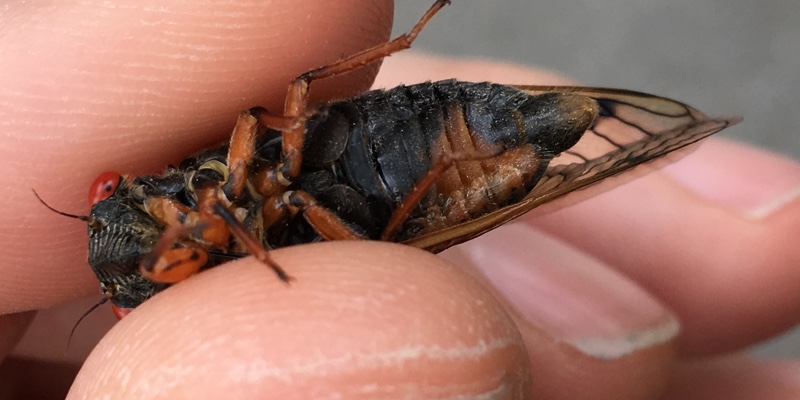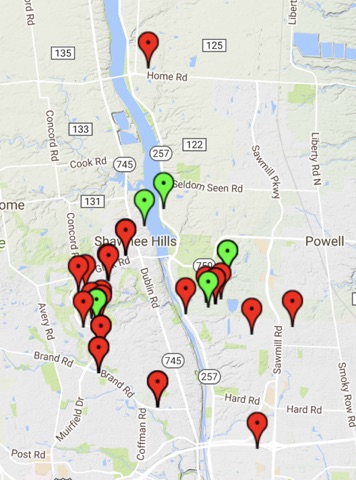I’ll cut to the chase, in terms of Brood VI, I only experienced the emergence via my web browser. I planned on visiting North Carolina but rain and car troubles stood in my way. I did travel to Wisconsin to try to find legendary populations said to exist there, but I found no cicadas. I drove routes 90, 14, 12, 23, and roads in between, but I had no luck finding them. My investigation was by no means comprehensive, but I covered as much ground as I could in the two days I was there and found no periodical cicadas.
Brood X stragglers are a different story. I missed seeing the massive Virginia/Maryland area populations, but I was able to see cicadas in Princeton, and the significant emergence in the Dublin area of Ohio.
Princeton, NJ
On May 20th I visited Princeton and found exuvia (shed skins/”shells”) on a pole next to where I parked my car, which was very encouraging. I headed for the Princeton Battle Monument park, a place where I saw massive numbers of cicadas in 2004. There, in 2017, I found exuvia but no adults — from 5 to as many as 200 per tree (I counted what I could see). The park was overflowing with squirrels and birds that would love to eat cicadas — I have no doubt why no stragglers survived. Blackbirds paced the lawn five abreast, like a small army systematically hunting for insect prey. During a normal emergence periodical cicadas emerge in such great numbers that many are able to get past the armies of hungry birds and rodents (this is called predator satiation). After visiting the park, I walked many side streets and found exuvia everywhere I went — not massive piles as we see during a normal, on-schedule emergence — but at least a few on every tree.
I returned on May 27th and actually found adult cicadas in Princeton. I found dozens of Magicicada cassini and a few Magicicada septendecim. There were not enough adults to form viable choruses. I doubt a few mated. I heard a single Magicicada cassini court song, so all least they were trying.
The most interesting cicada I saw was this Magicicada cassini with a mosaic pigment mutation, which caused the unusual orange marking on its abdomen. At first, I thought it was a Magicicada septendecim, but Chris Simon confirmed that it was not.

I also drove Rt 29 from Trenton to Frenchtown, across Rt 12 to Flemington, and down Rt 31 and heard no cicada populations. I visited Sourland Mountain. I visited many of the markers on Cicadas @ UCONN (formerly Magicicada.org) but found no cicadas, and certainly no viable adult populations (no singing, not enough to perpetuate a population).
North of Dublin, Ohio
On June 10th I made it to the suburbs north of Dublin, Ohio (itself north of Columbus). There I encountered a very active periodical cicada emergence. I mostly found Magicicada cassini, but I could hear Magicicada septendecim from time to time. I have little doubt that many cicadas mated and some of their progeny will survive to appear in another 14 or 17 years.

Cedar Springs, OH
When I’m mapping cicadas I try to stop at every rest stop and welcome center to look for cicadas. I found periodical cicada exuvia at a rest stop on Rt 70 hear Cedar Springs, Ohio. This was a nice find because I didn’t see any sightings in this area on the Cicadas @ UCONN (formerly Magicicada.org) map.
Indianapolis, IN, near Ft. Harrison State park
I passed through Indianapolis, IN twice on my way to and from Wisconsin. I found some exuvia on the outskirts of Ft. Harrison State Park, but nothing inside the park (weird).
4 replies on “My 2017 Brood X and VI Experiences”
Just had a black nymph land on my knee sitting at Ravinia Park waiting for a performance by Judy Collins and Stephen Stills which may be difficult to hear over the insect opus.
I live in valley city Ohio. Just south of cleveland
I spotted one today! Can hear them not nearly as loud as last year. Have a picture of one.
I live in the middle of Brood VI, they are just starting to emerge here. The rain the cold temps have kept them inside..
Maybe this is a good time for a road trip.